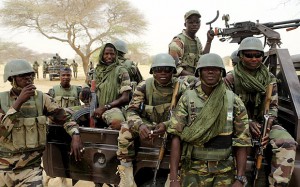West African nations previously untouched by extremists have been target of attacks this year
West Africa should “think harder” about developing a new anti-terror force, a top regional official said, as Niger announced the latest deaths among its troops battling Boko Haram jihadists.
Over the past year West Africa has suffered terror attacks on nations previously untouched by jihadists, as well as confronting an Islamist insurgency that began in northeast Nigeria but has spread to several other neighbouring countries.
That meant greater intelligence sharing and military co-operation is required, said the incoming head of the Economic Community of West African States (Ecowas) commission, which implements policy decisions agreed by its 15 members.
“The multiplication of terrorist hotbeds in our region compels us to share information on their activities, to communicate, co-ordinate and harmonise our efforts,” said Benin’s Marcel Alain de Souza at an Ecowas summit in Dakar.
“This naturally makes us think harder about the creation of a regional intervention force against terrorism,” he added, according to comments released by Senegal’s state news agency APS.
He was speaking after 32 troops were killed in a clash with Boko Haram fighters on Niger’s border with Nigeria, one of deadliest tolls inflicted by the jihadists.
A multinational force from Nigeria, Niger, Chad, Benin and Cameroon already exists and is due to launch a major offensive on Boko Haram around Lake Chad.
But Boko Haram’s seven-year insurgency has left at least 20,000 people dead in Nigeria and made more than 2.6 million homeless, leading to calls for more support within the region.
Senegal’s President Macky Sall, the outgoing chairman of Ecowas, said Muslim-majority states such as his own had nothing in common with Boko Haram, describing terrorism as an ongoing “source of concern”.
As expected during the session, Liberian President Ellen Johnson Sirleaf was named the new chairman of Ecowas, the APS agency reported, for what is also expected to be her final year as Liberia’s president. Gambian President Yahya Jammeh did not appear at the meeting, after months of harsh words for hosts Senegal due to a border dispute.
There was also a palpable nervousness at the regional gathering with the news that Guinea Bissau’s sacked prime minister Domingos Simoes Pereira might attempt to make an appearance along with his recently appointed replacement.
Although the new premier Baciro Dja appeared alone, a group of around 40 protesters appeared to denounce his presence, which is viewed as unconstitutional by some lawmakers in his own PAIGC party.
scmp.com



